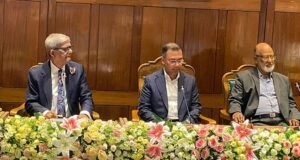
US Ambassador to Bangladesh Peter Haas on Thursday said his country looks forward to deepening work with the private sector and other stakeholders in Bangladesh to advance internationally recognized labor rights in the RMG industry and beyond.
“The recent minimum wage review for the readymade garment sector has demonstrated the clear need for an objective, inclusive and evidence-based National Wage Policy that addresses the severe economic challenges faced by garment workers,” he said while speaking at an event marking Bangladesh Cotton Day 2023, reports UNB.
Haas said strong labor laws and their implementation are vital to bilateral relationship, sustainable and inclusive development, and to support a stable and predictable operating environment for US companies operating in Bangladesh.
“As we look at the readymade garment sector, one of our mission’s priorities here in Bangladesh is a sustainable and broadly shared prosperity realized through improved labor standards,” the US ambassador said.
“This brings me to labor rights which are critical to the continued growth and sustainability of the readymade garment sector in Bangladesh,” he added.
The US envoy reminded that on November 16, US Secretary of State Antony Blinken announced the new US Presidential Memorandum on “Advancing Worker Empowerment, Rights, and High Labor Standards Globally.”
“This new global labor strategy calls on all US government agencies to intensify engagements with governments, labor organizations, trade unions, civil society, and the private sector to promote and protect the rights to freedom of association and collective bargaining,” he said.
“I again want to thank all of you for being great partners with the United States and great customers of US cotton. I hope today’s event will be beneficial for you and teach you even more about the benefits of including US cotton in your business,” he said.
BGMEA President Faruque Hassan requested Ambassador Peter Haas to convey to the US administration on what they are doing for the RMG industry and workers.
 Weekly Bangla Mirror | Bangla Mirror, Bangladeshi news in UK, bangla mirror news
Weekly Bangla Mirror | Bangla Mirror, Bangladeshi news in UK, bangla mirror news







